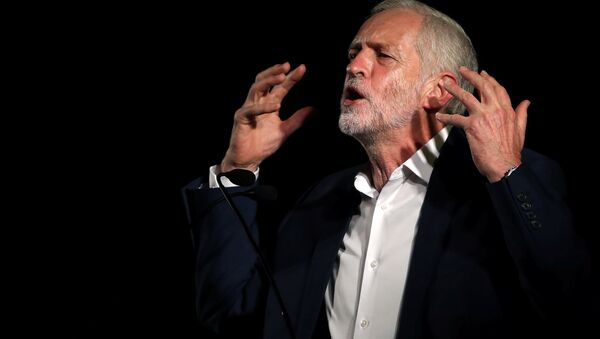Corbyn — a veteran backbencher from the party's left — became an unlikely Labour leader on September 12, 2015, after former chief Ed Miliband vacated his post in the wake of Labour's disappointing general election result.
Initially thought to have no chance of winning the leadership, Corbyn's straight-talking, anti-austerity message created a positive impression, with Corbyn collecting 60 percent of the vote and winning the leadership election in a landslide.
It’s exactly one year since Jeremy was elected leader of our Labour Party🎉 pic.twitter.com/pO0WODlYC3
— Jeremy Corbyn for PM (@JeremyCorbyn4PM) September 12, 2016
From the beginning, Corbyn's left-wing views were at odds with many others within the party, with critics noting that Corbyn only made it on the Labour leadership ballot paper because he gained the nominations of several MPs who did not support his views, but simply wanted to expand the debate.
Early Baptism of Fire
Despite grassroots Labour party membership numbers soaring and securing the support of the UK's biggest trade unions, Corbyn faced early challenges as Labour leader, with many former shadow cabinet ministers refusing to serve under his leadership.
The Labour leader was also subject to an aggressive media campaign from parts of the UK's right-wing press, which focused everything Corbyn, from his dress sense, to the accusation that he was riding a "Chairman Mao-style bicycle."
For one year, Corbyn has taken an unprecedented battering from the media, the establishment and even his own MPs — for us #ThankYouJeremy
— Susan (@marthasydenham) September 12, 2016
The one-sided press coverage has since been analysed by academics, with a London School of Economics study finding that Corbyn had been "thoroughly delegitimized" by large parts of the UK media.
The Labour leader was also accused of unpatriotic behaviour after video footage found that he didn't sing the national anthem during a Second World War remembrance service. However Corbyn hit back, saying he was standing in "respectful silence."
Jeremy Corbyn singing Great Britain's national anthem. pic.twitter.com/CQprKhssuk
— HubertusVenator (@HubertusVenator) June 18, 2016
Early Victories
It wasn't all bad news for Corbyn however, with the Labour leader earning praise for his opposition to the then Cameron government's plans to slash US$5.8 billion (£4.4 billion) worth of tax credits from low-paid workers.
After longstanding criticism, former Chancellor George Osborne was forced to perform a humiliating U-turn, handing Corbyn an early victory over the Conservatives.
One year on:
— Theo Bertram (@theobertram) September 12, 2016
1. Corbyn more determined than expected
2. Achieved bigger membership change than expected
3. Policy is thinner than expected
The Labour leader was also praised for his new approach to Prime Minister's Questions, with Corbyn sourcing questions from constituents and concerned members of the public as part of his plan to introduce a "nicer, kinder" politics.
While critics argued that Corbyn was unelectable with the wider public, the Labour leader took confidence from the December by-election result in Oldham West and Royton, which saw Labour candidate Jim McMahon win the seat with an increased majority, while Sadiq Khan's London mayoral election win was claimed by Corbyn supporters as a sign of the leader's electoral appeal.
#Corbyn's Labour have never been ahead on the average of poils in coming up for one year. #bbcqt pic.twitter.com/hMzCEAATW2
— Gerry Hassan (@GerryHassan) September 8, 2016
The Labour leader was also vindicated for his longstanding opposition to the Iraq war following the release of the Chilcot report in July, which was hugely critical of the actions of former Prime Minister Tony Blair in the lead-up to the British invasion of Iraq in 2003.
Internal Dissidence
However, the victories were fraught with international criticism, with Corbyn's left-wing views on key issues at odds with many others in the party.
Corbyn, who himself was a long-time party rebel, faced challenges from within his own cabinet over the issues of Trident renewal and the UK parliament's decision to launch airstrikes in Syria as part of an anti-Daesh coalition.
#PMQs yet again @jeremycorbyn lets May of the hook through failure to use follow up question #useless We need a real opposition! #Notcorbyn
— Dave Tantum (@DaveTantum) September 7, 2016
These challenges undermined Corbyn's authority as Labour leader, with numerous MPs criticizing their leader's approach to both issues.
Brexit Bombshell to Leadership Challenge
While anti-Corbyn opposition from within the Labour party had been consistent, it exploded on the morning of June 24, when many shocked Britons woke to the news that the UK had voted to leave the EU.
Corbyn — a long-time euroskeptic himself — was savaged by Labour colleagues, who accused him of running a half-hearted campaign to try and stay in the EU.
Lord Prescott puts #Labour leadership travails down to 'midsummer madness' not, say, #JeremyCorbyn failure to defeat ruinous #Brexit
— Alex Connock (@MrAlexConnock) July 1, 2016
After Corbyn sacked former shadow foreign secretary Hillary Benn over an alleged leadership plot, dozens more cabinet ministers resigned from their posts, with Corbyn also emphatically losing a no-confidence vote among Labour MPs 172-40.
.@JeremyCorbyn says @OwenSmith_MP's "deal" to unite the party didn't make sense #bbcqt #LabourLeadership pic.twitter.com/QTymoWNbNg
— Jeremy for Labour (@jeremyforlabour) September 8, 2016
With Corbyn refusing to resign, some critics raised concerns that the Labour party may actually split, while the incident triggered a leadership challenge, with the election results between Corbyn and challenger Owen Smith to be announced on September 24.
While polls suggest Corbyn is set for another landslide win, whether he can unite the party to form a credible challenge at the 2020 general election is yet to be seen.


